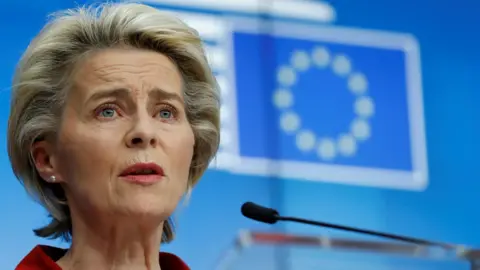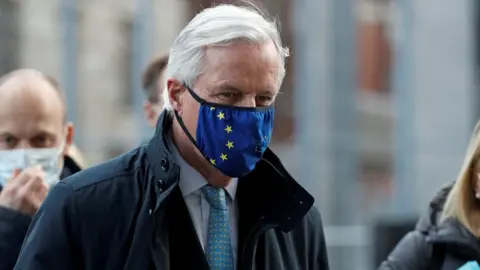Brexit: Progress made in tough areas, says EU chief
 Reuters
ReutersProgress has been made in important areas of post-Brexit trade talks with the UK in recent days, the president of the EU Commission has said.
Ursula von der Leyen said there had been "more movement" on problematic issues after "difficult weeks with very, very slow progress".
But she warned there were "some metres to the finish line" to reach agreement.
It comes as negotiations moved online after a positive Covid result among the EU team.
Face-to-face talks between the two sides in Brussels were suspended on Thursday after the test result in the team of EU chief negotiator Michel Barnier.
The two sides are racing to strike a deal to govern their trading relationship once the UK's post-Brexit transition period ends in January 2021.
Negotiations will continue via video link on Friday and over the weekend, as the two sides work out when in-person discussions will be able to resume.
BBC Brussels correspondent Nick Beake said he had been told Mr Barnier would now self-quarantine following the team member's test result.
But it was understood no members of the UK team would be required to self-isolate, our correspondent added.
'Three main issues'
Speaking to reporters in Brussels ahead of this weekend's virtual G20 summit hosted by Saudi Arabia, Mrs von der Leyen said "time pressure is high" to reach a deal.
But she added that negotiators would have "substance" to discuss during video conferences because legal text for a deal was on the table.
"After difficult weeks with very, very slow progress now we have seen in the last days better progress, more movement on important files. This is good."
 Reuters
ReutersShe added that fishing rights, competition rules and how a deal would be enforced remained the "three main issues" in the negotiations.
But she said progress had been made over "state aid" rules limiting government subsidies for industry.
The EU has demanded tough limits on such spending as part of any trade deal, arguing they are necessary to ensure fair economic competition.
'Growing concern'
The two sides are also negotiating how closely the UK should have to follow the EU's social, labour, and environmental standards after the transition.
They are also haggling over how much access European fishing boats should have to British waters, and how much they would be allowed to catch from next year.
On Friday, EU ambassadors were told there was a "good chance" of striking a deal if the UK shows political will.
On Sunday, before the latest round of talks got under way, chief UK negotiator Lord David Frost said there had been "some progress" but warned talks "may not succeed".
He added that any deal would have to be "compatible with our sovereignty," and allow the UK to "take back control of our laws, our trade, and our waters".
An EU diplomat told the BBC there was "growing concern" that a deal might not be struck in time for it to be ratified before the end of December.
Any agreement will have to be signed off by the European Parliament before it can come into force. It could also require eventual ratification in EU national parliaments, depending on the contents of the deal.
On the UK side, any agreement would normally be subject to a scrutiny period in Parliament of 21 sitting days - although there are ways for the government to get round this.
The diplomat added EU countries agreed that contingency planning for no deal should be "ramped up" so the bloc is prepared for "every possible outcome".
